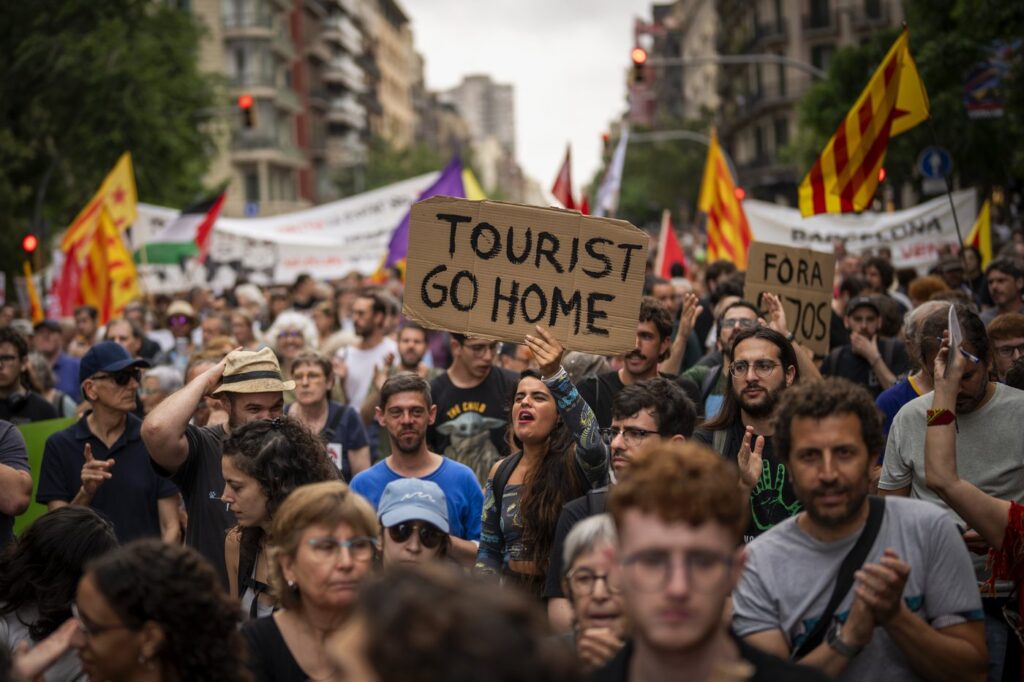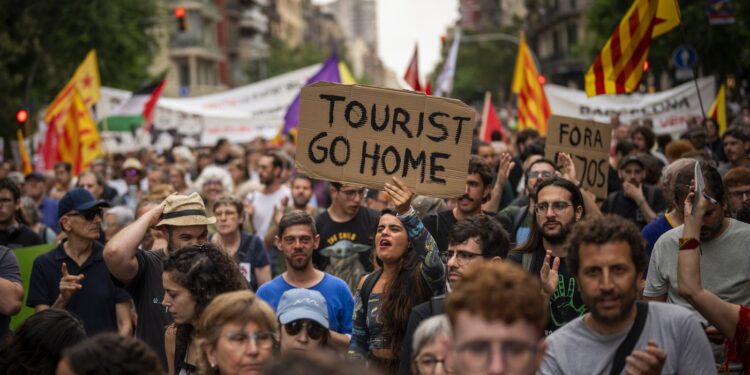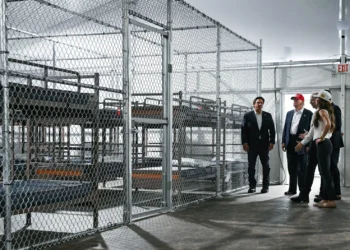The Spanish government has taken a significant step in regulating the short-term rental market by ordering Airbnb to remove over 65,000 listings that violate existing regulations.

This bold move aims to address the country’s housing affordability crisis, which has been exacerbated by the proliferation of short-term rentals. The lack of license numbers and unclear ownership details were among the primary reasons for the crackdown.
The government’s goal is to protect locals from rising rents and combat housing shortages. As the debate around the impact of short-term rentals continues, this development is expected to have significant implications for the rental market and travelers alike.
Key Takeaways
- The Spanish government has ordered Airbnb to block over 65,000 listings.
- The crackdown is due to violations of rental laws, including lack of license numbers.
- The goal is to combat housing shortages and protect locals from rising rents.
- The move is expected to impact the rental market and travelers.
- The regulation aims to address the housing affordability crisis.





Spain’s Massive Airbnb Purge: What Just Happened
In a significant move, Spain has blocked more than 65,000 Airbnb listings in its latest effort to regulate short-term rentals. This drastic measure is part of the government’s broader strategy to address the Spain housing crisis by ensuring compliance with local laws and protecting long-term housing availability for residents.
The Scale of the Crackdown
The consumer rights ministry is leading the crackdown, which aims to curb the proliferation of short-term rentals that have contributed to the housing affordability crisis. The removal of over 65,000 listings is a significant step, demonstrating the government’s commitment to enforcing Spain short-term rental rules.
Ministry of Housing’s Official Statement
The Ministry of Housing has issued a statement emphasizing the necessity of this crackdown to protect the right to housing. Housing Minister Pablo Bustinduy has been at the forefront of this initiative, highlighting the need to balance the tourism industry with the housing needs of local residents.
Immediate Effects on the Rental Market
The immediate effects on the rental market have been significant, with many landlords and property managers scrambling to comply with the new regulations. This move is expected to have a profound impact on the availability of long-term rentals, potentially easing the pressure on the housing market.
As the situation continues to unfold, it’s clear that Pablo Bustinduy Airbnb policies will play a crucial role in shaping the future of short-term rentals in Spain. The government’s actions underscore its commitment to addressing the housing crisis and ensuring that tourism benefits both visitors and local residents.
The Spain Airbnb Crackdown: Airbnb Spain Under Fire
Housing Minister Pablo Bustinduy’s recent announcement has put Airbnb Spain in the spotlight, amidst a broader crackdown on illegal listings. The Spanish government’s move to block over 65,000 listings has significant implications for the short-term rental market.
Pablo Bustinduy’s Role
Housing Minister Pablo Bustinduy has been instrumental in Spain’s crackdown on illegal short-term rentals. His ministry has been working to ensure that all rental listings comply with local regulations, including having the necessary licenses and documentation. The ministry’s efforts aim to address the housing crisis by curbing illegal rentals.
The minister’s stance is clear: “We will not allow illegal rentals to continue, as they contribute to the housing shortage and rising rent prices.” This stance has been supported by various local authorities who have been struggling to manage the impact of short-term rentals on their housing markets.
Airbnb’s Official Response
Airbnb has responded to the crackdown by stating that it will continue to appeal the decision, claiming that the ministry has overstepped its authority. The platform argues that it has been working to ensure compliance among its hosts, providing tools and guidelines to help them understand and meet local regulations.
Airbnb’s stance is that collaboration, rather than confrontation, is the key to resolving the issues surrounding short-term rentals. The platform is keen to work with local authorities to find a balanced solution that supports both hosts and the broader community.
Platform Compliance Challenges
One of the significant challenges Airbnb faces is ensuring that its listings comply with local laws and regulations. This involves verifying the legitimacy of listings, ensuring hosts have necessary documentation, and maintaining transparency about who is listing properties.
| Compliance Challenge | Description | Airbnb’s Response |
|---|---|---|
| Verifying Host Identity | Ensuring hosts are who they claim to be and have the right to rent out properties. | Implementing ID verification processes for hosts. |
| License and Documentation | Ensuring hosts have the necessary licenses and documentation to rent out properties. | Providing guidelines and tools to help hosts comply with local regulations. |
| Listing Transparency | Making sure listings are accurate and transparent, including details about the property and host. | Enhancing listing details to include more information about the property and host. |

The crackdown on Airbnb in Spain highlights the complex issues surrounding short-term rentals. As the situation develops, it will be crucial for all parties involved to work together to find a solution that balances the needs of hosts, travelers, and local communities.
Why Spain Is Taking Action: Housing Crisis Explained
Rising housing costs in Spain have led to widespread protests and government intervention. The country’s housing crisis has been exacerbated by the proliferation of short-term rentals, leading to a surge in rent prices and displacement of local residents.
Rising Rent Prices in Major Cities
The rapid growth of short-term rentals in major cities like Barcelona and Madrid has significantly reduced the availability of long-term housing, driving up rent prices. As a result, many residents are struggling to afford their homes.
- Rent prices in Barcelona have increased by over 20% in the past two years.
- Madrid has seen a similar surge, with rents rising by 15% in the same period.
Local Resident Displacement
The shift towards short-term rentals has not only inflated rent prices but also led to the displacement of local residents. Neighborhoods that were once residential are now dominated by tourist accommodations.
The human impact of this crisis is significant, with many families and long-term residents forced to relocate.

Nationwide Protests Against Housing Shortages
The housing crisis has sparked nationwide protests, with tens of thousands of Spaniards demanding action on unaffordable rents. The government has responded by implementing regulations aimed at curbing the growth of short-term rentals.
The new regulations, including Spain’s short-term rental law 2024, aim to restore balance to the housing market and protect long-term housing availability for residents.
Inside the Violations: Why These Listings Were Removed
Airbnb listings in Spain are facing a significant purge due to non-compliance with local regulations. The Spanish government’s crackdown has resulted in the removal of over 65,000 listings, primarily due to violations related to licensing, documentation, and ownership transparency.
Missing License Numbers and Documentation
A significant number of listings were removed because they lacked the required license numbers or had fake documentation. In Spain, tourist apartments must display a valid license number, known as the Número de Registro de Turismo, to operate legally. Hosts who failed to provide this information or provided false data faced removal from the platform.
| Violation Type | Description | Consequence |
|---|---|---|
| Missing License Numbers | Listings without a valid Número de Registro de Turismo | Removal from Airbnb |
| Fake Documentation | Providing false license numbers or documents | Listing removal and potential legal action |
Ownership Transparency Issues
Another critical issue leading to the removal of listings was the lack of transparency regarding ownership. The Spanish authorities require clarity on whether a property is owned by an individual or a corporation.
Individual vs. Corporate Ownership
The distinction between individual and corporate ownership is crucial for tax purposes and regulatory compliance. Listings that failed to disclose this information were deemed non-compliant.
Tax Compliance Problems
Tax evasion is a significant concern for the Spanish government. Listings suspected of tax non-compliance, particularly those not clearly declaring their ownership structure, were targeted in the crackdown. Ensuring tax compliance is essential for hosts wishing to continue listing their properties on platforms like Airbnb.

Hosts in Spain must now ensure they comply with all regulations, including displaying valid license numbers and maintaining transparency about ownership and tax compliance. Failure to do so risks listing removal and potential legal consequences.
The Legal Battle: Madrid High Court Decision
Airbnb’s legal battle with the Spanish government took a significant turn with the Madrid High Court’s latest verdict. The court’s decision has far-reaching implications for the short-term rental market in Spain and potentially across Europe.
Court’s Ruling Details
The Madrid High Court backed the order to remove over 65,000 Airbnb listings, deeming them non-compliant with current regulations. This ruling is a significant victory for the Spanish government, led by Housing Minister Pablo Bustinduy, who has been vocal about the need to regulate short-term rentals to address the housing crisis.
Key aspects of the ruling include:
- Validation of the government’s authority to regulate short-term rentals
- Support for the Ministry of Housing’s crackdown on unauthorized listings
- Emphasis on the need for transparency and compliance with existing laws
Airbnb’s Appeal Plans
Despite the setback, Airbnb has stated its intention to continue appealing the decision. The company argues that the ministry has overstepped its authority and that the ruling could have unintended consequences for the tourism industry.
“We believe that the court’s decision fails to consider the complexities of the short-term rental market,” said an Airbnb spokesperson. “We will continue to work with the government to find a solution that balances the needs of hosts, travelers, and local communities.”
Legal Precedents in European Tourism Law
The outcome of this legal battle could set important precedents for European tourism law. Other countries may look to Spain’s approach as a model for regulating short-term rentals.
| Country | Regulatory Approach | Impact on Listings |
|---|---|---|
| Spain | Strict regulation, removal of unauthorized listings | Over 65,000 listings removed |
| France | Registration requirements, caps on rentals | Significant reduction in new listings |
| Italy | Regional regulations, taxation on rentals | Varying impacts across regions |
Timeline of Spain’s Short-Term Rental Regulations
In a bid to address housing shortages, Spain has introduced a series of regulations on short-term rentals, aiming to create a more transparent and compliant rental market.
The journey towards stricter regulations began with significant announcements and implementations across various stages. Here are the key milestones:
Barcelona’s 2028 Ban Announcement (June 2023)
In June 2023, Barcelona announced plans to ban short-term rentals by 2028, marking a significant shift in the city’s approach to managing tourism and housing.
National Registry Implementation (March 2024)
Following the announcement, March 2024 saw the implementation of a national registry for short-term rentals. This registry aims to increase transparency by requiring all short-term rental properties to be registered, ensuring they meet specific standards and regulations.
Mass Removal of Listings (July 2024)
In July 2024, a massive purge of non-compliant listings occurred, with over 65,000 listings being removed from platforms like Airbnb. This action was part of the government’s effort to enforce the new regulations strictly.
Future Regulatory Milestones
Looking ahead, future regulatory milestones are expected to include further measures to enhance compliance and transparency. These may involve stricter monitoring of rental platforms, increased penalties for non-compliance, and continued efforts to address the root causes of housing shortages.
The Spanish government’s proactive approach to regulating short-term rentals is set to continue, with a focus on creating a fair and sustainable housing market for both locals and tourists.

- Barcelona plans to ban short-term rentals by 2028.
- A national registry for short-term rentals was implemented in March 2024.
- Over 65,000 non-compliant listings were removed in July 2024.
- Future regulations will focus on enhancing compliance and transparency.
Barcelona: Ground Zero for Spain’s Vacation Rental Reform
Barcelona has been at the epicenter of Spain’s vacation rental reform due to its severe housing crisis. The city has been facing significant challenges in balancing its tourism industry with the need to provide affordable housing for its residents.
Barcelona’s Unique Housing Challenges
Barcelona’s housing market is characterized by high demand and limited supply, which has driven up rent prices and made it difficult for locals to find affordable housing. The proliferation of short-term rentals has exacerbated this issue, as many properties that could be used for long-term rentals are instead being used for vacation rentals.
The city has seen a significant increase in housing costs, with some areas experiencing rent increases of over 10% in the past year alone. This has led to concerns about the displacement of long-term residents and the erosion of the city’s cultural fabric.
Local Regulations vs. National Framework
Barcelona has implemented its own regulations on short-term rentals, which are in line with the national framework. The city requires hosts to obtain a license to rent out their properties, and there are strict penalties for non-compliance.
The local regulations have been designed to work in conjunction with the national framework to ensure a cohesive approach to managing the vacation rental market. This includes measures to increase transparency and compliance among hosts, as well as to monitor the impact of short-term rentals on the housing market.
Tourism Management Solutions
Barcelona is exploring various tourism management solutions to mitigate the negative impacts of short-term rentals. One approach is to limit the number of tourist licenses issued in certain areas, to prevent over-tourism and protect the character of neighborhoods.
| Tourism Management Solutions | Description | Impact |
|---|---|---|
| Limiting Tourist Licenses | Restricting the number of licenses issued in certain areas | Reduces over-tourism and preserves neighborhood character |
| Increasing Transparency | Requiring hosts to provide detailed information about their rentals | Enhances compliance and helps monitor the market |
| Monitoring Housing Market | Tracking the impact of short-term rentals on long-term housing availability | Allows for data-driven policy decisions |
What Travelers Need to Know: Navigating Spain’s New Rental Landscape
Travelers to Spain must now navigate a new reality in vacation rentals due to the government’s crackdown. The Spanish government has been taking significant steps to regulate short-term rentals, resulting in over 65,000 listings being blocked.
How to Verify a Listing’s Legality
To ensure a smooth vacation, travelers can verify a listing’s legality by checking the national registry and confirming that the host has the necessary licenses and documentation. This simple step can help avoid potential issues during your stay.
When booking, look for the license number or registration details provided in the listing description or host information. You can cross-check this information on the official government or local tourism websites.

Alternative Accommodation Options
For those who prefer not to use Airbnb or other short-term rental platforms, there are alternative accommodation options available in Spain. Hotels, hostels, and other regulated forms of lodging can provide a safe and compliant alternative.
Additionally, travelers can consider vacation rentals managed by licensed property managers or agencies that comply with Spanish regulations. These alternatives can offer a similar experience to Airbnb while ensuring compliance with local laws.
Rights and Protections for Tourists
Under Spanish law, tourists have rights and protections that ensure a safe and secure accommodation experience. If you encounter any issues with your rental, you can seek assistance from local authorities or consumer protection agencies.
It’s also advisable to understand your consumer rights and the terms of your rental agreement. Being informed can help you navigate any potential disputes or issues that may arise during your stay.
Conclusion: The Future of Holiday Rentals in Spain
The Spain Airbnb crackdown has marked a significant shift in the regulation of short-term rentals. As part of the spain short-term rental law 2024, the national registry and stricter enforcement will reshape the industry. The government’s commitment to protecting the right to housing and ensuring a sustainable tourism industry is evident in the massive purge of Airbnb listings.
The future of holiday rentals in Spain will be shaped by these new regulations. Airbnb Spain will need to comply with the updated laws, and the platform’s users will need to adapt to the changes. While there are challenges ahead, the government is taking steps to balance the needs of residents and tourists.
As the spain airbnb crackdown continues to make headlines, it is clear that the country is taking a proactive approach to managing its tourism industry. By understanding the new regulations and verifying the legality of listings, travelers can navigate the changing landscape and enjoy their stay in Spain.
FAQ
What is the main reason behind Spain’s crackdown on Airbnb?
The Spanish government’s primary concern is the housing affordability crisis, which has been exacerbated by the proliferation of short-term rentals.
How many Airbnb listings were removed in the Spanish government’s crackdown?
The Spanish government’s crackdown on Airbnb resulted in the removal of over 65,000 listings.
What are the main violations that led to the removal of Airbnb listings in Spain?
The main violations included missing license numbers and documentation, as well as ownership transparency issues, such as individual vs. corporate ownership and tax compliance problems.
Can I still rent my apartment on Airbnb in Spain?
To rent your apartment on Airbnb in Spain, you must comply with local regulations, including obtaining the necessary licenses and documentation, and registering with the national registry.
How can I verify if an Airbnb listing is legal in Spain?
You can verify a listing’s legality by checking the national registry and ensuring that the host has the necessary licenses and documentation.
What are the alternative accommodation options in Spain besides Airbnb?
Alternative accommodation options in Spain include hotels and other regulated forms of lodging.
What rights and protections do tourists have under Spanish law when using Airbnb?
Tourists have the right to a safe and secure accommodation, and are protected under Spanish law.
What is the future of short-term rentals in Spain?
The future of short-term rentals in Spain will be shaped by the new regulations, including the national registry and stricter enforcement, with a focus on protecting the right to housing and ensuring a sustainable tourism industry.
Is there a ban on short-term rentals in Barcelona?
Barcelona has announced a ban on short-term rentals by 2028, as part of the city’s efforts to manage tourism and protect long-term housing availability for residents.
What is the role of the national registry in Spain’s short-term rental regulations?
The national registry is a key component of Spain’s short-term rental regulations, requiring hosts to register their properties and comply with local regulations.





















































